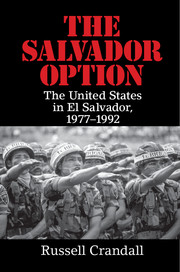Book contents
- Frontmatter
- Dedication
- Epigraph
- Contents
- List of Figures
- List of Organizations
- Acknowledgments
- 1 Introduction
- PART ONE EL SALVADOR IN THE COLD WAR
- PART TWO JIMMY CARTER
- PART THREE RONALD REAGAN
- 19 Reagan Arrives
- 20 Reagan and Salvador
- 21 El Mozote
- 22 Another Vietnam
- 23 Solidarity
- 24 Troop Cap and Certifying Human Rights
- 25 Reagan Gambles on Elections, 1982
- 26 The Shultz Doctrine
- 27 Human Rights
- 28 Henry Kissinger
- 29 Contras
- 30 “Elections Yes, Dialogue No,” 1984 Presidential Election
- 31 La Palma
- 32 Esquipulas
- 33 Counterinsurgency I
- 34 Counterinsurgency II
- 35 Zona Rosa
- 36 Air War
- 37 José Napoleón Duarte
- 38 Iran-Contra
- PART FOUR GEORGE H. W. BUSH
- PART FIVE POSTWAR
- Notes
- Bibliography
- Index
20 - Reagan and Salvador
from PART THREE - RONALD REAGAN
Published online by Cambridge University Press: 05 June 2016
- Frontmatter
- Dedication
- Epigraph
- Contents
- List of Figures
- List of Organizations
- Acknowledgments
- 1 Introduction
- PART ONE EL SALVADOR IN THE COLD WAR
- PART TWO JIMMY CARTER
- PART THREE RONALD REAGAN
- 19 Reagan Arrives
- 20 Reagan and Salvador
- 21 El Mozote
- 22 Another Vietnam
- 23 Solidarity
- 24 Troop Cap and Certifying Human Rights
- 25 Reagan Gambles on Elections, 1982
- 26 The Shultz Doctrine
- 27 Human Rights
- 28 Henry Kissinger
- 29 Contras
- 30 “Elections Yes, Dialogue No,” 1984 Presidential Election
- 31 La Palma
- 32 Esquipulas
- 33 Counterinsurgency I
- 34 Counterinsurgency II
- 35 Zona Rosa
- 36 Air War
- 37 José Napoleón Duarte
- 38 Iran-Contra
- PART FOUR GEORGE H. W. BUSH
- PART FIVE POSTWAR
- Notes
- Bibliography
- Index
Summary
I think Mr. Reagan will find an irreversible situation in El Salvador by the time he reaches the presidency.
– Fermán Cienfuegos, FMLN leaderI think we are now observing a stalemate. And in that kind of war, if you are not winning, you are losing.
– Lieutenant General Wallace Nutting, Commander, U.S. Southern Command, 1981Tiny El Salvador represented one of the largest foreign policy challenges when Reagan entered the White House. In an indication of the attention El Salvador was getting, television reporter Walter Cronkite began his interview with the new president by asking, “Mr. President, with your administration barely six weeks old, you're now involved in, perhaps, the first foreign policy crisis…much concern about El Salvador and our commitment there. Do you see any parallel in our committing advisors and military assistance to El Salvador and the early stages of our involvement in Vietnam?” Later in the same interview Reagan explained that Soviet expansionism was at the core of the conflict. “Without actually using Soviet troops, in effect, the Soviets are, you might say, trying to do the same thing in El Salvador that they did in Afghanistan, but by using proxy troops through Cuba and guerrillas.” Reagan added that he was “watching very carefully” to see if the Sandinistas were sending arms to the FMLN.
Earlier that same month, at one of President Reagan's first press conferences on March 6, 1981, he was asked, “How do you intend to avoid having El Salvador turn into a Vietnam for this country?” Reagan's complaint back to reporters was, “I didn't start the El Salvador thing. I inherited it. And the previous administration, which probably was as vociferous as anyone in talking about my threat to peace, they [the Carter administration] were doing what we're doing: sending aid to El Salvador.” When the president was charged for leading the nation into war in Central America, he joked, “I've been here more than six weeks now and haven't fired a shot.”
The Haig Approach
Upon taking office on January 20, 1981, the victorious Reagan administration wasted no time in reinforcing its campaign rhetoric by taking a harder public stand against communist intrusion into the hemisphere.
- Type
- Chapter
- Information
- The Salvador OptionThe United States in El Salvador, 1977–1992, pp. 213 - 222Publisher: Cambridge University PressPrint publication year: 2016

